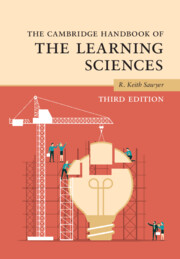Book contents
- The Cambridge Handbook of the Learning Sciences
- The Cambridge Handbook of the Learning Sciences
- Copyright page
- Contents
- Figures
- Tables
- Contributors
- Preface
- 1 An Introduction to the Learning Sciences
- Part I Foundations
- Part II Methodologies
- Part III Grounding Technology in the Learning Sciences
- Part IV Learning Together
- Part V Learning Disciplinary Knowledge
- Part VI Moving Learning Sciences Research into the Classroom
- 29 Learning as a Cultural Process
- 30 Designing for Meaningful Learning
- 31 Advances in Teacher Learning Research in the Learning Sciences
- 32 Learning Sciences and Policy
- 33 The Learning Sciences in the 2020s: Implications for Schools and Beyond
- Index
- References
31 - Advances in Teacher Learning Research in the Learning Sciences
from Part VI - Moving Learning Sciences Research into the Classroom
Published online by Cambridge University Press: 14 March 2022
- The Cambridge Handbook of the Learning Sciences
- The Cambridge Handbook of the Learning Sciences
- Copyright page
- Contents
- Figures
- Tables
- Contributors
- Preface
- 1 An Introduction to the Learning Sciences
- Part I Foundations
- Part II Methodologies
- Part III Grounding Technology in the Learning Sciences
- Part IV Learning Together
- Part V Learning Disciplinary Knowledge
- Part VI Moving Learning Sciences Research into the Classroom
- 29 Learning as a Cultural Process
- 30 Designing for Meaningful Learning
- 31 Advances in Teacher Learning Research in the Learning Sciences
- 32 Learning Sciences and Policy
- 33 The Learning Sciences in the 2020s: Implications for Schools and Beyond
- Index
- References
Summary
This chapter reviews the contribution of the learning sciences to teacher learning research, with particular consideration of how cognitive, sociocognitive, sociocultural, and improvement-focused perspectives extend teacher learning research. Learning scientists study all phases of teacher learning, including preservice education (before becoming a teacher), the first few years of teaching, and ongoing mastery throughout the career. Research often focuses on teaching practices – what teachers do in the classroom and how they move from novice to expert performance. Teacher learning can be supported through collaboration with other teachers in a professional learning community (PLC); through coaching and mentoring; through videos of expert teaching practice; and through educative curriculum materials.
Keywords
- Type
- Chapter
- Information
- The Cambridge Handbook of the Learning Sciences , pp. 619 - 637Publisher: Cambridge University PressPrint publication year: 2022
References
- 1
- Cited by

